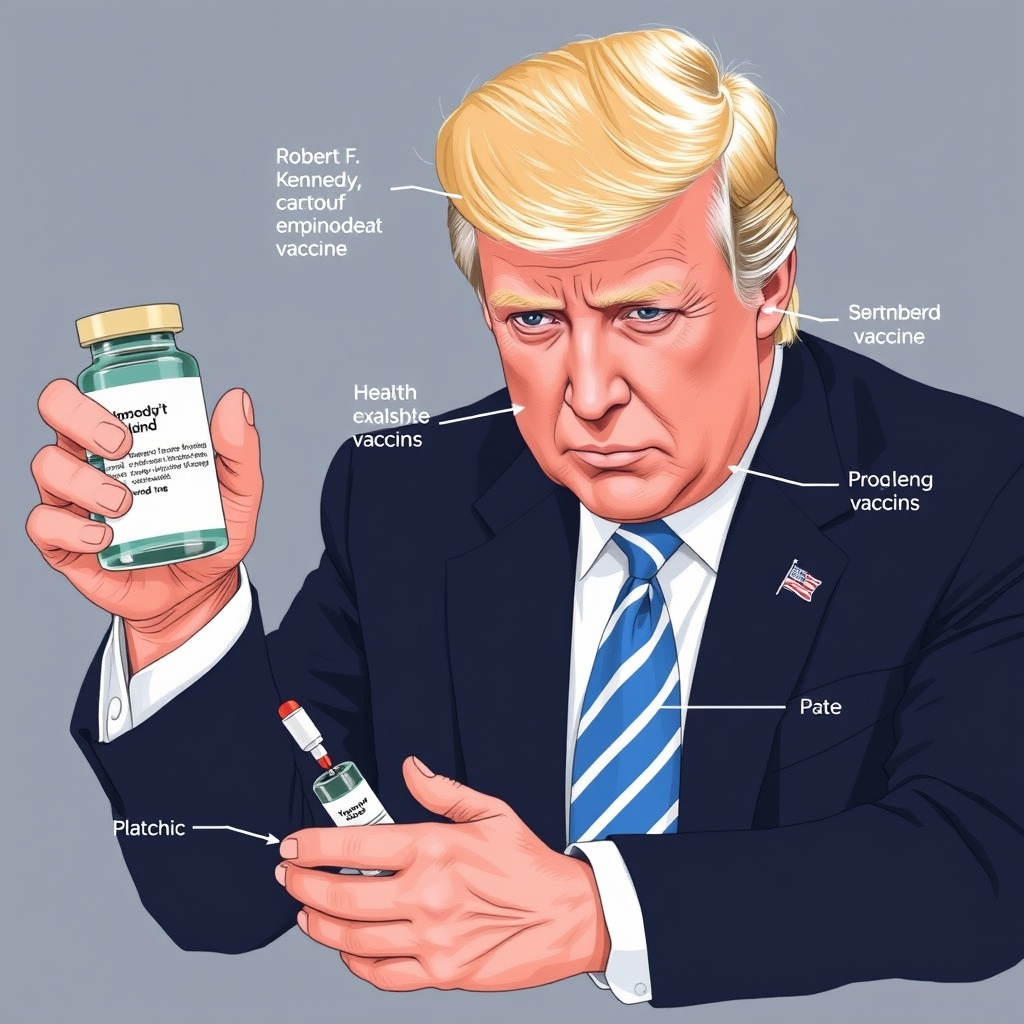Introduction
The debate surrounding vaccines has been a contentious issue in the United States, with various stakeholders holding differing opinions on their safety and efficacy. Recently, President Donald Trump has publicly backed Robert F. Kennedy Jr., the Health Secretary, who has been at the forefront of the vaccine debate, despite the potential health and political risks associated with his stance. This article aims to delve into the intricacies of the vaccine debate, the role of Robert F. Kennedy Jr., and the implications of President Trump's support for his stance.
The Vaccine Debate: A Complex Issue
The vaccine debate is a complex and multifaceted issue, with proponents arguing that vaccines are a crucial tool in preventing the spread of infectious diseases, while opponents raise concerns about their safety and potential side effects. According to the Centers for Disease Control and Prevention (CDC), vaccines have been instrumental in controlling and eliminating many infectious diseases, such as smallpox, polio, and measles. However, some individuals, including Robert F. Kennedy Jr., have expressed concerns about the potential risks associated with vaccines, including the use of mercury-based preservatives and the potential for adverse reactions.
Despite the overwhelming scientific evidence supporting the safety and efficacy of vaccines, the anti-vaccination movement has gained significant traction in recent years, with many parents opting not to vaccinate their children due to concerns about potential side effects. This trend has been linked to a resurgence of preventable diseases, such as measles and whooping cough, highlighting the need for continued education and awareness about the importance of vaccination.
Robert F. Kennedy Jr.: A Vocal Critic of Vaccines
Robert F. Kennedy Jr. has been a vocal critic of vaccines, arguing that they are not as safe as the scientific community claims. As the Health Secretary, he has used his platform to raise awareness about the potential risks associated with vaccines, including the use of mercury-based preservatives and the potential for adverse reactions. Kennedy has also been a proponent of vaccine choice, arguing that parents should have the right to decide whether or not to vaccinate their children.
While Kennedy's stance on vaccines has been met with significant criticism from the scientific community, he has also gained a significant following among parents who are concerned about the potential risks associated with vaccines. His advocacy has led to the introduction of legislation aimed at increasing transparency and accountability in the vaccine industry, including the creation of a vaccine safety commission.
President Trump's Support: A Calculated Move?
President Trump's decision to back Robert F. Kennedy Jr. on vaccines has been seen as a calculated move, aimed at appeasing his conservative base while also potentially undermining the credibility of the scientific community. Trump has a history of questioning the safety and efficacy of vaccines, having previously suggested that they may be linked to autism, a claim that has been thoroughly debunked by the scientific community.
By supporting Kennedy's stance on vaccines, Trump may be attempting to appeal to voters who are skeptical of the scientific consensus on vaccines. However, this move also carries significant risks, including the potential to exacerbate the spread of preventable diseases and undermine the credibility of the scientific community.
According to a recent survey conducted by the Pew Research Center, 77% of Americans believe that vaccines are safe, while 21% believe that they are not. The same survey found that 80% of Americans believe that vaccines are effective in preventing the spread of diseases, while 17% believe that they are not. These statistics highlight the significant divide in public opinion on vaccines, with a majority of Americans supporting the use of vaccines, while a significant minority remains skeptical.
Implications and Future Directions
The implications of President Trump's support for Robert F. Kennedy Jr.'s stance on vaccines are far-reaching and complex. On one hand, it may lead to increased awareness and education about the potential risks associated with vaccines, potentially driving innovation and improvement in the vaccine industry. On the other hand, it may also exacerbate the spread of preventable diseases, undermine the credibility of the scientific community, and perpetuate misinformation about vaccines.
As the debate surrounding vaccines continues to evolve, it is essential to rely on scientific evidence and expert opinion to inform public policy and decision-making. The scientific community must continue to engage with the public, addressing concerns and providing accurate information about the safety and efficacy of vaccines.
In conclusion, the vaccine debate is a complex and contentious issue, with significant implications for public health and policy. While Robert F. Kennedy Jr.'s stance on vaccines has been met with criticism from the scientific community, it has also raised important questions about the need for transparency and accountability in the vaccine industry. President Trump's support for Kennedy's stance carries significant risks, but it also highlights the need for continued education and awareness about the importance of vaccination.
Conclusion
The debate surrounding vaccines is a contentious and complex issue, with significant implications for public health and policy. As the scientific community continues to engage with the public, addressing concerns and providing accurate information about the safety and efficacy of vaccines, it is essential to rely on evidence-based decision-making and expert opinion to inform public policy.
The support of President Trump for Robert F. Kennedy Jr.'s stance on vaccines is a calculated move, aimed at appeasing his conservative base while potentially undermining the credibility of the scientific community. However, it is crucial to prioritize the health and well-being of the American people, relying on scientific evidence and expert opinion to inform decision-making.
As we move forward, it is essential to continue the conversation about vaccines, addressing concerns and providing accurate information about their safety and efficacy. By working together, we can ensure that the American people have access to accurate information, and that our public health policies are informed by the best available evidence. Ultimately, the goal must be to protect the health and well-being of the American people, while also promoting transparency and accountability in the vaccine industry.


Leave a comment